Contents
Lois Meets Mac | Serving the Community: Family Inspiration | Setting an Example: Life-long Learning | An Eye to History: Preserving for Future Generations | Carrying On in the New Century | Aging Gracefully | Sources
Lois Meets Mac
Soon after his arrival in Vermont in 1952 to take advantage of an opportunity to acquire equity at The Burlington Free Press and to take up residence in Burlington, Mac’s first marriage dissolved.
“Lois and I became acquainted with each other and with each other’s extended families. We developed a joint circle of friends and vowed to learn from the hurt of our first failed marriages.”
At that time, it was unusual to divorce and to raise a blended family. Lois shared:
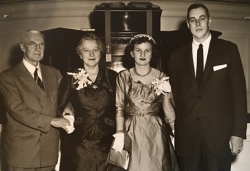 “I was living with my parents in Burlington with my two young daughters, at the end of a five-year marriage. Mac also was soon to accept that his ten-year marriage was over, regretful to lose much contact with his two sons… Two and a half years later, we found we were both older and wiser, and wanting to, daring to, start a life together. From the start Mac understood and talked about how it was a ‘package deal,’ the three of us would be his new family.”
“I was living with my parents in Burlington with my two young daughters, at the end of a five-year marriage. Mac also was soon to accept that his ten-year marriage was over, regretful to lose much contact with his two sons… Two and a half years later, we found we were both older and wiser, and wanting to, daring to, start a life together. From the start Mac understood and talked about how it was a ‘package deal,’ the three of us would be his new family.”
After a small family ceremony December 15, 1954, Mac and Lois set up housekeeping in South Burlington and their son Jim was born the summer of 1956. Lois recalled their early years together:
“As a family, our lives were very much involved with his workaholic lifestyle and ambition; that was the way it was. This was not a great change from my family life as my father was equally absorbed with the newspaper and with community life. Anything Mac ever thought or dreamed was possible. He was never depressed or discouraged by obstacles. Anything could be done -- and was.”
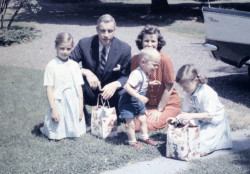 Their lives were full and followed the rhythm of the seasons and of work and school. The couple had an active social life and were committed to their communities. Mac was active in the local Chamber of Commerce activities and would eventually become a board member of the Howard Bank and the Shelburne Museum and a visiting professor at Champlain College (then a two-year business school). Lois served as scout leader and hospital auxiliary member and eventually served on the board of the local hospital, following in the footsteps of her father and grandfather.
Their lives were full and followed the rhythm of the seasons and of work and school. The couple had an active social life and were committed to their communities. Mac was active in the local Chamber of Commerce activities and would eventually become a board member of the Howard Bank and the Shelburne Museum and a visiting professor at Champlain College (then a two-year business school). Lois served as scout leader and hospital auxiliary member and eventually served on the board of the local hospital, following in the footsteps of her father and grandfather.
“Like our parents before us, we donated what we could to the fundraising campaigns of our churches and communities, but we devoted our discretionary income to acquiring stock in the Free Press.”
When their younger daughter Judy developed cancer of the kidney at the end of the 1950s, Mac and Lois made every effort to obtain treatment for her and then made her comfortable at home in her final months of decline. Lois channeled her grief into helping the family to move forward and into volunteer service for the American Cancer Society in Chittenden County. Mac and Lois found solace, too, in making memorial donations in Judy’s honor to the Orchard School library and to the new All Saints Episcopal church being built in South Burlington.
During the remainder of the 1960s the couple worked to build the business and to acquire, with several of Mac’s department heads, ownership of the Free Press. The business flourished and the owners acquired another newspaper in Pennsylvania, to which they brought their expertise honed at the Free Press.
Serving the Community: Family Inspiration
Both Mac and Lois had a strong dedication to their community and were influenced by powerful examples of public service and generosity that would lead them toward a life of devoting “time, talent, and treasure” on behalf of community needs. Lois had a strong example of public service from her Grandmother Howe.
Lois wrote in the 1990s of Annie Howe's example:
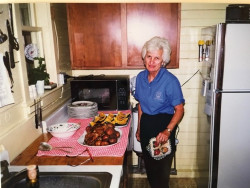 “Each summer when we return to our cottage in Charlotte, I renew my connection with my grandmother, Annie B. Howe. She and her husband, Willard, bought it one hundred years ago. I can see the lilies-of-the-valley that she planted and grow for me every year as well as two spectacular beds of orange daylilies right in front of the porch. I serve dessert in the same cut glass dishes she and her family used for ice cream, the weekly treat made in a hand-cranked freezer.
“Each summer when we return to our cottage in Charlotte, I renew my connection with my grandmother, Annie B. Howe. She and her husband, Willard, bought it one hundred years ago. I can see the lilies-of-the-valley that she planted and grow for me every year as well as two spectacular beds of orange daylilies right in front of the porch. I serve dessert in the same cut glass dishes she and her family used for ice cream, the weekly treat made in a hand-cranked freezer.
"All of this is very nice, and wonderful that generations can be linked this way. I hope my grandchildren will have the same opportunity to share these things in future years.
"But my grandmother left me a lot more than this. She was the oldest daughter of a minister and had learned the ways of family life years before she married and brought up seven children. She also was aware of community beyond the family and knew what her duties and opportunities were in this area.
"Although brought up in Victorian times when women had assigned roles to fulfill and rarely ventured outside these limits, Annie Howe lived for some twenty years after her husband died and her children had left home. From her home in Burlington, she became a board member and served as president of Howard Relief, a social agency which helped the needy. She visited lonely people from her church. She wrote checks to help the hospital, Children’s Aid Society, Red Cross, and others who called upon her. She lived a simple life and felt she was fortunate enough to be able to do for others.
"I remember especially during World War II that she knit endless pairs of socks for the Red Cross. Thus, she was in touch with needs in the larger world around her. Those socks would comfort soldiers in trenches in France, men she had never met in a place she had never been. After the war, she returned to knitting mittens for the children of Burlington.
"In earlier years, both my husband and I did a lot of volunteer service to help others and gave as we could as she (and my parents as well) had done in their day. I guess you might say that philanthropy in its many forms is a tradition in our family.”
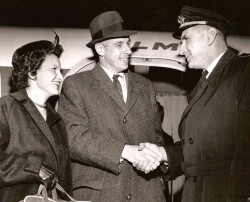 In addition to her responsibilities at home and as a volunteer, Lois entertained for advertisers of the newspaper and traveled extensively with Mac during the late 1950s and throughout the 1960s in order to attend newspaper trade group conferences to learn of new ideas to build the newspaper business that was so much a part of their lives. They courted national advertisers too, and a relationship with air carrier KLM enabled them to travel to Europe a few times. Mac’s gift as a speaker and Lois’s voracious reading that enabled her to engage in lively conversations with new acquaintances ultimately helped to grow the revenues of the newspaper and to shine a national spotlight on the newspaper group that Mac and his team had built.
In addition to her responsibilities at home and as a volunteer, Lois entertained for advertisers of the newspaper and traveled extensively with Mac during the late 1950s and throughout the 1960s in order to attend newspaper trade group conferences to learn of new ideas to build the newspaper business that was so much a part of their lives. They courted national advertisers too, and a relationship with air carrier KLM enabled them to travel to Europe a few times. Mac’s gift as a speaker and Lois’s voracious reading that enabled her to engage in lively conversations with new acquaintances ultimately helped to grow the revenues of the newspaper and to shine a national spotlight on the newspaper group that Mac and his team had built.
The couple moved on to Rochester, New York in 1971 when The Burlington Free Press and the acquired Pennsylvania paper was exchanged for Gannett Newspapers, Inc., stock and Mac assumed the role of Vice President of Marketing for Gannett. Lois was active there as an American Cancer Society volunteer, a planning committee member of the United Way, and a trustee of Gennesee Hospital. She also served on various boards of nonprofit and women’s organizations.
In an oral interview in 2014 Lois spoke extensively about her extensive board service in the 1960s and 1970s:
“I attended meetings and did research projects that were assigned and found it a positive experience. In Burlington, women were scarce on boards so the women felt they represented [all] women. I felt listened to.”
Setting an Example: Life-long Learning
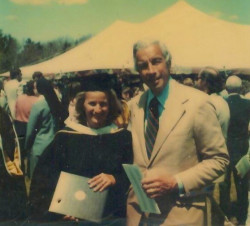 It was in Rochester that Lois was able to continue her own education at Nazareth College, close to their home. With her husband traveling often, her daughter married and living overseas, and her son established in his new high school, she had time to become active in her new community through the American Cancer Society and to take classes. She found that her hospital board experience came into play as she wrote papers for her classes. Lois observed that this wouldn’t have happened if she had attended college right out of high school. She graduated with a degree in sociology in 1975 and served on the board of Nazareth College for several years, and later on the board of Champlain College. She would have continued her education to a master’s degree level if it were not for the commute to Buffalo that continuing her education would have required.
It was in Rochester that Lois was able to continue her own education at Nazareth College, close to their home. With her husband traveling often, her daughter married and living overseas, and her son established in his new high school, she had time to become active in her new community through the American Cancer Society and to take classes. She found that her hospital board experience came into play as she wrote papers for her classes. Lois observed that this wouldn’t have happened if she had attended college right out of high school. She graduated with a degree in sociology in 1975 and served on the board of Nazareth College for several years, and later on the board of Champlain College. She would have continued her education to a master’s degree level if it were not for the commute to Buffalo that continuing her education would have required.
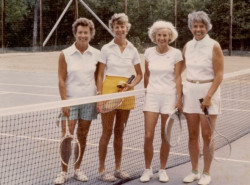 When she and Mac moved to Florida in 1975, Lois found ways to support her new community. She served on the boards of the chapel and medical center in their new retirement community, ran a furniture consignment store with a friend, entertained extensively, and played tennis almost daily. Mac was easing his way toward retirement at this point, having founded a marketing consulting business and a personal motivation program called “Freedom to Achieve.” Lois served as his secretary, travel manager, and researcher and taught herself computer word processing in the early 1980s, investing in a portable Osborne computer that could be brought to Vermont each summer when the couple drove north to reconnect with family and friends in Vermont. She was an early adopter of email and kept up lively correspondence with family and friends. During this time, Lois learned about the joys of being a grandparent as she continued entertaining often, honing her crossword puzzle skills and traveling to new destinations via People-to-People tennis tours.
When she and Mac moved to Florida in 1975, Lois found ways to support her new community. She served on the boards of the chapel and medical center in their new retirement community, ran a furniture consignment store with a friend, entertained extensively, and played tennis almost daily. Mac was easing his way toward retirement at this point, having founded a marketing consulting business and a personal motivation program called “Freedom to Achieve.” Lois served as his secretary, travel manager, and researcher and taught herself computer word processing in the early 1980s, investing in a portable Osborne computer that could be brought to Vermont each summer when the couple drove north to reconnect with family and friends in Vermont. She was an early adopter of email and kept up lively correspondence with family and friends. During this time, Lois learned about the joys of being a grandparent as she continued entertaining often, honing her crossword puzzle skills and traveling to new destinations via People-to-People tennis tours.
The couple was learning more, too, about asset management and estate planning as their stake in Gannett Newspapers grew at a dizzying pace: stock shares split several times, dividends increased and prices soared during the time that Mac was one of the company’s largest stockholders.
Meanwhile, Lois and Mac were transforming their impulse toward public service into a new kind of philanthropy. Mac extended his experience with Gannett Company’s matching gifts program into their own “challenge” grants to inspire others to contribute. While Mac appeared to be the face of their growing community philanthropy, their decisions to support various projects and programs were joint ones. Lois used her years of extensive volunteering and board service to help guide them as she and Mac took their first big steps as philanthropists: becoming lead donors of a new Red Cross headquarters (1975) and hospital wing and helping expand the University of Vermont library (1978) in Burlington in honor of Lois’s father, David W. Howe.
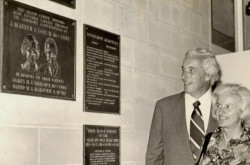 Soon thereafter, at the annual meeting of the Burlington chapter of the American Red Cross, Lois praised the organization’s 2,196 volunteers: “In any volunteering, it is neighbor helping neighbor, showing that they care.” Lois recalled for the group her own association with the Red Cross:
Soon thereafter, at the annual meeting of the Burlington chapter of the American Red Cross, Lois praised the organization’s 2,196 volunteers: “In any volunteering, it is neighbor helping neighbor, showing that they care.” Lois recalled for the group her own association with the Red Cross:
“I was surprised to see what a large part of my life it has been. My grandfather, W. B. Howe, was on the first Board of the Chittenden County Chapter. My grandmother knit mittens for the Red Cross. I remember paying 10 cents and getting a lapel button as a Junior Red Cross member and my mother doing Gray Lady work at the Mary Fletcher Hospital during World War II.”
 Lois gave blood and took a Red Cross first aid course and for many years volunteered each summer at the canteen.
Lois gave blood and took a Red Cross first aid course and for many years volunteered each summer at the canteen.
“In every age, in every generation, crisis or no, someone has to care. Our job is to multiply our talents, to make sure we are broadening the base of those who do care.”
Lois would become the recipient of several honorary degrees between the 1980s and the new millennium. She would eventually help decide that the foundation which would bear the McClure name would focus its mission on broadening access to life-long education for all Vermonters.
An Eye to History: Preserving for Future Generations
Lois and Mac’s 1978 commitment to help expand the UVM library, dedicated in 1980, was in honor of Lois’s father, David W. Howe, and the value he placed on “the printed word.” David, a UVM graduate in the Class of 1914 and editor of the student newspaper, often encouraged his children and grandchildren to keep journals. He had served as an army aviator in World War I; the newsy letters he sent back from the front to his family in Burlington were later compiled by his brother so they could be shared with David’s extended family.
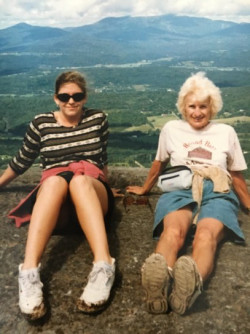
In the early 1980s, as Mac set to work compiling for his family a journal of his life and career, Lois composed a family history and histories of several organizations for which she served as secretary or historian. Assuming positions on boards of directors allowed Lois to put to work her "ahead-of-the-curve" computer skills. At home, Lois was the principal family photographer and clipper of tear sheets and she kept a growing library of family scrapbooks and files of philanthropic endeavors that she would enjoy sharing with her children and grandchildren when they visited. Mac became a frequent speaker and she helped type and archive many of these. They attended many graduations, were awarded numerous honorary degrees, and supported many community organizations and initiatives.
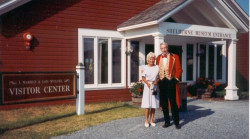 The 1980s were busy years for Lois and Mac, both as donors and as patriarch and matriarch for their extended families. Their philanthropy, which is documented in Mac’s journal and “Hands On” Philanthropy, encompassed numerous projects in Chittenden Country, Vermont; in Rochester, New York; and Mac’s community of Athens, Ohio. Highlights include the building of a new visitors center and relocation of a round barn as the “Gateway Center” of the Shelburne Museum in 1986 and the endowment of a professorship in muscular-skeletal research at the UVM School of Medicine in 1987. The couple were recipients as well as donors: they were awarded honorary doctoral law degrees by the University of Vermont in May 1983 and UVM’s highest award, the Ira Allen Award, in 1988.
The 1980s were busy years for Lois and Mac, both as donors and as patriarch and matriarch for their extended families. Their philanthropy, which is documented in Mac’s journal and “Hands On” Philanthropy, encompassed numerous projects in Chittenden Country, Vermont; in Rochester, New York; and Mac’s community of Athens, Ohio. Highlights include the building of a new visitors center and relocation of a round barn as the “Gateway Center” of the Shelburne Museum in 1986 and the endowment of a professorship in muscular-skeletal research at the UVM School of Medicine in 1987. The couple were recipients as well as donors: they were awarded honorary doctoral law degrees by the University of Vermont in May 1983 and UVM’s highest award, the Ira Allen Award, in 1988.
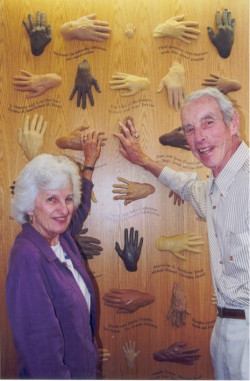 As their philanthropy continued into the 1990s, Mac and Lois were drawn to projects that served the needs of the wider community. They provided major support for the Vermont Respite House, The Lake Champlain Basin Center/ECHO, the Multi-Generation Center, Howard Center for Developmental Services, COTS, and more. And they signed on as supporters of the recently created Vermont Community Foundation, establishing two donor-advised funds there.
As their philanthropy continued into the 1990s, Mac and Lois were drawn to projects that served the needs of the wider community. They provided major support for the Vermont Respite House, The Lake Champlain Basin Center/ECHO, the Multi-Generation Center, Howard Center for Developmental Services, COTS, and more. And they signed on as supporters of the recently created Vermont Community Foundation, establishing two donor-advised funds there.
The McClures also became committed to historical preservation. Mac explained:
“The 1990s heralded the “Information Age” and signaled increasing changes to come in the new millennium. Many of these changes will affect us in ways we cannot even imagine today and there remains a continual risk that we will destroy important aspects of our heritage or simply forget who we truly are. So it became obvious to Lois and to me that “recording and preserving” should be a critical part of any community’s plans for progress. That is certainly true of Vermont, where natural resources and cultural heritage are valued over rapid development or change. There are so many worthwhile preservation projects and opportunities near our home that we decided that we would do our part to assist in the preservation of Americana and the natural resources of the Champlain Valley.”
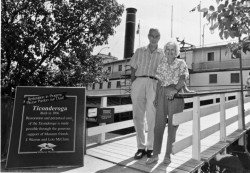 In this time, Mac and Lois supported efforts to preserve historic barns and to foster historic education – including spearheading Shelburne Museum's effort to preserve the steamship ‘Ticonderoga’ for generations to come. The ship had special meaning for the couple: Lois’s father and grandfather commuted on the ship when they summered lakeside in Charlotte and Lois boarded it for excursions and dances in her youth. Mac’s first trip to Vermont in 1952 included a trip on the "Ti" – during which he fell in love with Lake Champlain and the Burlington area. And Lois and her family were passengers for the steamship’s final voyage in 1953, after which it was purchased by Mrs. Webb and transported overland to the Shelburne Museum along a rail line specifically constructed for the historic enterprise. As newlyweds, Mac and Lois took their daughters for Sunday drives to see the "Ti" at its new home; four decades later, they regularly visited to follow the preservation progress of Chip Stuhlen and his staff of professional craftspeople.
In this time, Mac and Lois supported efforts to preserve historic barns and to foster historic education – including spearheading Shelburne Museum's effort to preserve the steamship ‘Ticonderoga’ for generations to come. The ship had special meaning for the couple: Lois’s father and grandfather commuted on the ship when they summered lakeside in Charlotte and Lois boarded it for excursions and dances in her youth. Mac’s first trip to Vermont in 1952 included a trip on the "Ti" – during which he fell in love with Lake Champlain and the Burlington area. And Lois and her family were passengers for the steamship’s final voyage in 1953, after which it was purchased by Mrs. Webb and transported overland to the Shelburne Museum along a rail line specifically constructed for the historic enterprise. As newlyweds, Mac and Lois took their daughters for Sunday drives to see the "Ti" at its new home; four decades later, they regularly visited to follow the preservation progress of Chip Stuhlen and his staff of professional craftspeople.
Mac and Lois celebrated the dedication of the refurbished ‘Ticonderoga’ in September 1998. By this time, the couple had been touched by health challenges: Lois broke her foot in May 1996 and later that year Mac was diagnosed with lymphoma and skin cancer. Treatments for these ensued, as did the implanting of a pacemaker for Mac. By the late 1990s, it was apparent that Mac was experiencing memory impairment. He rededicated his efforts to record personal and family history and with the help of Lois and daughter Barbara self-published ‘"Hands On" Philanthropy in fall 2000. Copies of the hard-bound book were distributed to family members, friends, business associates, and philanthropic partners as a way of sharing the couple’s story and decades-long effort to support their communities and preserve Vermont treasures for generations to come.
Carrying On in the New Century
In 2001, Lois received an honor she never dreamed of: a new ship named for her. Mac and Lois had become supporters of the Lake Champlain Maritime Museum, whose mission to preserve the marine artifacts at the bottom of Lake Champlain had grown more urgent with the recent invasion of zebra mussels into the lake. In 1997 the couple pledged a matching gift of $500,000 to the museum to develop an exhibit at the planned Lake Champlain Basin Science Center in Burlington that would give the museum more exposure and induce the public to visit the museum’s attractive main facility in Ferrisburgh.
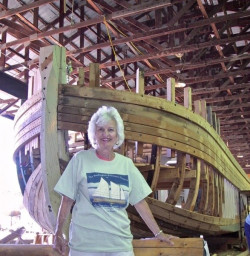 When learning of the honor, “Lois was bowled over,” recalled daughter Barbara and son-in-law Bill, present at the announcement event. Mac and Lois were frequent visitors over the next few years to the Burlington lakefront boat shed where craftspeople and volunteers constructed a replica of an historic Lake Champlain sailing schooner based on plans devised from shipwrecks discovered in the lake.
When learning of the honor, “Lois was bowled over,” recalled daughter Barbara and son-in-law Bill, present at the announcement event. Mac and Lois were frequent visitors over the next few years to the Burlington lakefront boat shed where craftspeople and volunteers constructed a replica of an historic Lake Champlain sailing schooner based on plans devised from shipwrecks discovered in the lake.
Lois was able to retain the couple’s independent lifestyle until 2002, when Mac’s Alzheimer’s disease advanced and they settled as permanent residents at the Wake Robin continuing care community in Shelburne, Vermont. With the help of dedicated caregiver David Minert, Mac was able to accompany Lois on outings and in philanthropic activities and family affairs up until the last year or so of his life, when he moved to nursing care at Wake Robin.
Lois experienced with Mac the “long good-bye” that so often accompanies Alzheimer’s disease. She was with him as he passed from pneumonia the evening of April 7, 2004. The brochure distributed at his memorial included these reflections from Lois, written in the last year of Mac’s life:
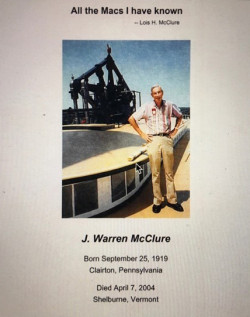 “Recently I have been concerned because everyone who met Mac in recent years didn’t get to know the ‘real’ Mac. And deep inside I worry that maybe I am one of these people, struggling to try to come to terms with what is reality now as opposed to how he was in the past.
“Recently I have been concerned because everyone who met Mac in recent years didn’t get to know the ‘real’ Mac. And deep inside I worry that maybe I am one of these people, struggling to try to come to terms with what is reality now as opposed to how he was in the past.
Stuck in my mind somewhere is the Mac who rose to every occasion, looked at every set-back as an opportunity, and was passionate in all his commitments. He was a man who always stood out, not just because he was six feet four inches tall…. If I try really hard, I can visualize a man always ‘on the go.’”
Aging Gracefully
Until Mac’s death, Lois had not greatly considered her own aging. She was nearly seven years younger than Mac, had overcome minor health obstacles of her own, and was fit and blessed with ample resources, energy, and enthusiasm. It took some time to readjust to life as a widow before she allowed herself some time to reflect:
"So I have come to another stopping place. I will be eighty years old in 2006. It has taken me all those years to learn so much about living a life and so many other things. As with many other old women, I am sure, I find myself at times reflecting on the years gone by. It is amazing how the passage of time gives one new insights!
"I realize now, though I never gave it much thought, that never in my life have I lived alone. There were times when I would have loved to have a few hours or days by myself, but it is a lot different than I would have imagined. I am fortunate to be in a place where there are plenty of other people around with whom to socialize. But at the end of the day—and at the beginning, also – there is just me."
Lois, then 78, began to plan and build the next chapter of her life. She maintained oversight of family and financial matters and sole responsibility for the couple’s portfolio of philanthropic interests. She read widely about current events, informed herself about causes and organizations she believed were doing good work, and kept up with friends and family through traveling and lively email exchanges. She welcomed the first of the couple’s fifteen great-grandchildren in 2005 and 2006.
Throughout her life, Lois savored the beauty of the outdoors as a skier, sailor, tennis player, golfer, hiker, birdwatcher, and gardener. These interests would continue to serve her well. Lois maintained her own cottage garden at Wake Robin and snowshoed on the campus into her mid-80s. She continued exercising regularly and found many stimulating friends and programs at Wake Robin and beyond to keep her active. She also found her membership in the Trinity Episcopal Church community uplifting and volunteered to help with monthly dinners for senior citizens in the wider community.
Lois now had first-hand experience with the devastating effects of Alzheimer’s disease and with the medical community’s occasional lack of compassion and understanding in their interface with memory-impaired patients. She began having conversations with Mac’s physician at the Memory Care Center, Dr. William Pendlebury, who recalls that Lois:
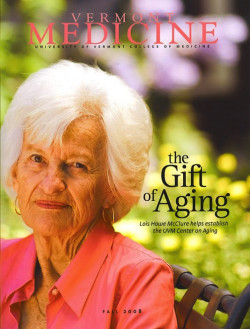 "[…] became very concerned and interested in promoting age-related healthcare and the dignity of age-related healthcare. She was always very attentive, asked great questions, and clearly became very aware about issues relating to aging, aging health, and particularly the dignity that should be associated with caring for people with elders.
"[…] became very concerned and interested in promoting age-related healthcare and the dignity of age-related healthcare. She was always very attentive, asked great questions, and clearly became very aware about issues relating to aging, aging health, and particularly the dignity that should be associated with caring for people with elders.
"The Center on Aging was specifically launched in 2008, following Lois’s very generous $5M contribution to endow the Center, which at the time was one of the largest gifts ever given to the University to support a program. The idea for the Center on Aging went back to the late 1990s, when a group of faculty got together to study aging and to promote education and research on aging throughout the state. That program never received great support from the University and did not prosper financially or programmatically. At some point in the early 2000s, we reconvened and created a task force to look into revitalizing the Center. Lois participated in that task force and her level of interest, enthusiasm, and knowledge was quite evident over the course of several meetings. The meetings led to a white paper which was presented to the Provost with ideas for revitalizing and renaming the program. Eventually, we had a meeting with Lois in the President’s office during which she very quickly said yes to endowing the Center. It wasn’t long after that that the donation as made official."
Lois’s work and generosity were featured in the cover story of the University of Vermont Medical School magazine in April of 2008.
Another significant gift in honor of Mac stemmed from Lois’s respect for Mac’s persistent efforts through his many years of service as a Museum board member to lower entrance fees to the Shelburne Museum. Working with Museum President Stephan Jost and his successor Tom Denenberg, Lois arranged an annual gift to enable Vermont residents to pay half the usual entrance fee at the Museum, which enables visitors two consecutive days to enjoy its grounds and exhibits.
Lois honored pledges and maintained contact with the causes she and Mac had supported together, notably Shelburne Farms, Shelburne Museum, the Champlain Housing Trust (formerly Burlington Land Trust), the Vermont Respite House, COTS, King Street Center, The Lake Champlain Maritime Museum, Rokeby Museum, and ECHO, on whose board Lois would serve for several years. She set about to determine where else their philanthropy might make the most impact on behalf of others and extended her major giving to the endowment campaigns of VPR, the Vermont Symphony, Lund, the Flynn Theater, and the Vermont Historical Society. She took an interest in conservation causes, “smart” development, the Visiting Nursing Association, the Snelling Center, and the Episcopal Diocese of Vermont.
Asked in a 2014 oral history interview what inspired her to give, Lois spoke of a variety of scenarios, including learning about a project that might not interest others where her giving could make a particular difference, and finding projects with a big enough impact that funders could join together to make a difference.
Brenda Torpy, CEO of Champlain Housing Trust, met Mac and Lois in the mid-1990s and has remained a friend since that time. Brenda relates:
"When we finally finished up development of the Multi-Gen building, I kept up with Lois. Every time I called her to talk, her outlook would just cheer me up. She’s relentlessly positive…. When Mac was sick, he visited the Multi-Gen Center regularly for programming, and I thought how amazing the circle of support in life can be. Mac and Lois were always so connected to the community in a way that was free of judgement, and so to see Mac supported by the Center was especially touching.
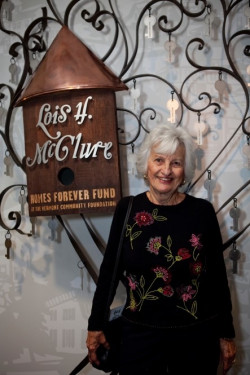 "In the late 1990s, the Housing Trust helped to lead a statewide collaboration that had a goal of doubling homeownership rates. I called Mac and Lois and asked whether they’d be interested in supporting the project. Their $200K contribution was their first program gift – and their first gift made from the J. Warren & Lois McClure Foundation. That gift got us off the ground and helped us to ultimately raise $1M for a program that did in fact double the percentage of homeowners.
"In the late 1990s, the Housing Trust helped to lead a statewide collaboration that had a goal of doubling homeownership rates. I called Mac and Lois and asked whether they’d be interested in supporting the project. Their $200K contribution was their first program gift – and their first gift made from the J. Warren & Lois McClure Foundation. That gift got us off the ground and helped us to ultimately raise $1M for a program that did in fact double the percentage of homeowners.
"When I think about Lois’s impact through our organization, I think about how she’s not only supported buildings that serve thousands of people, she’s actually supported direct programs that help people become homeowners. In so many ways, Lois has always been such a cheerleader for us.
"…The generosity of her heart, and the ways in which she shares and shows that generosity, amazed me. Until I got to know Lois, a philanthropist to me was someone who lived in another world. For me, personally, getting to know Lois broke down that conception of mine in a way that was powerful. Her spark sparked ME up! … She’s been a real role model."
Former Executive Director of the Vermont Historical Society Kevin Graffagnino recalled how Lois stepped up when that organization was in need of funds:
“Lois epitomizes what it means to be a real Vermonter. She takes you at face value for your qualities and accomplishments but does not evaluate you for how much you are worth. That’s a wonderful human quality. She’s a real person – who happens to have a lot of money and a deep sense of responsibility for how that money should be used for the benefit of others.”
And Art Cohn, marine archaeologist, historian, former executive director of the Lake Champlain Maritime Museum, and current Community Chaplain saw Lois navigate Mac’s illness and her own aging. He relates:
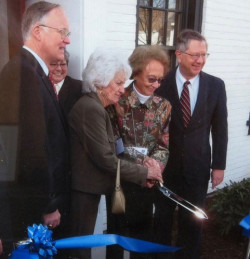 "I see the McClure name in all the right places and their long record of community giving is unequaled in our part of the world. I first remember seeing their name at the University of Vermont Hospital where whole floors are named for them. However it was in my visits to the Lois McClure-Bee Tabakin Hope Lodge and McClure-Miller Respite House that I more fully appreciated the depth and wisdom of the kind and gentle support that the McClure’s provide every day to people in need.”
"I see the McClure name in all the right places and their long record of community giving is unequaled in our part of the world. I first remember seeing their name at the University of Vermont Hospital where whole floors are named for them. However it was in my visits to the Lois McClure-Bee Tabakin Hope Lodge and McClure-Miller Respite House that I more fully appreciated the depth and wisdom of the kind and gentle support that the McClure’s provide every day to people in need.”
In 2005, together with long-time friend and summer neighbor Bee Tabakin, Lois spearheaded the campaign which resulted in the building of the new American Cancer Society Hope Lodge adjacent to the UVM Medical Center in Burlington for families with hospitalized family members. She also made significant contributions to Shelburne Farms for their continuing development and to the Shelburne Museum for a new year-round building. Alec Webb of Shelburne Farms spoke of her in an interview in 2019:
"Lois and Mac have been longtime friends and cheerleaders for Shelburne Farms. They played a pivotal role in the early development of the nonprofit organization, sponsoring the opening of The McClure Center for School Programs at the Farm Barn in 1993 and then being the catalysts for the effort to save the magnificent Breeding Barn for future generations. Most recently, Lois quietly seeded a major fundraising effort to pass the baton to the next generation of supporters and to help secure the Farm's historic campus and its many programs for the future. We are deeply grateful to have Lois as an Honorary Steward of Shelburne Farms. Her warmth, generosity, and enthusiasm continue to inspire all our work!"
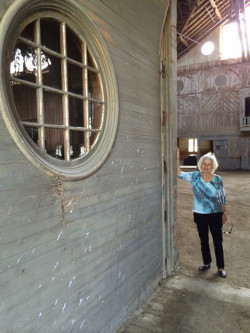 While Tom Denenberg of the Shelburne Museum related in 2019:
While Tom Denenberg of the Shelburne Museum related in 2019:
"It is impossible to imagine Shelburne Museum today without Lois and Mac McClure. With a rare combination of hands-on leadership and philanthropic largess they opened the museum up to generations of Vermonters, providing learning opportunities at every turn and creating community with propose and grace."
Tom spoke of Lois as a “great philanthropist” and “also the rarest of confidants” in that she listens closely, has offered exactly the right answer to the challenge at hand, and has ended many a conversation by saying “you can do this.”
Lois’s individual philanthropy peaked in 2009, when for a period of several years she was donating to six or seven dozen organizations. As macular degeneration began to slow her very active lifestyle and philanthropy, she began to taper her involvement in and undertaking of new philanthropic endeavors. By then, she had led the McClure Foundation as President for a decade and her daughter Barbara, Vice President, was spearheading the organization’s focus on a revised mission to support the development of Vermont’s human resources by improving equitable access to education and training after high school. Lois was ready to “retire” from her philanthropy, to channel her giving through the McClure Foundation and to cede the role of foundation President to Barbara, in order to center her life around Wake Robin and her family.
Vermonters showed appreciation for Lois’s efforts in many ways: notes and cards, award dinners, a Congressional Record citation by Senator Patrick Leahy in 2014, and when she was declared “Citizen of the Year” in 2014.
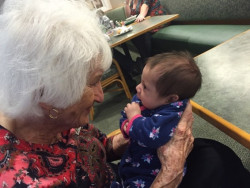 Lois was always humbled and surprised when she was approached upon her regular visits to the Shelburne Farmers’ Market by people who thanked her in person for her support of various organizations and initiatives and for her willingness to step forward to improve the larger community.
Lois was always humbled and surprised when she was approached upon her regular visits to the Shelburne Farmers’ Market by people who thanked her in person for her support of various organizations and initiatives and for her willingness to step forward to improve the larger community.
Lois was to have one more opportunity to step forward. Holly Miller and her late husband Bobby, Mac and Lois’s close personal friends and fellow lead donors of the first Vermont Respite House, approached Lois in the summer of 2015 to ask for her support in the building of a larger, more updated Respite House facility in Colchester. By now, Lois was living in assisted living facilities at Wake Robin after suffering mini-strokes in 2015 and experiencing progression of her macular degeneration. This campaign for a new Respite House was a meaningful and logical conclusion to her long career as a philanthropist.
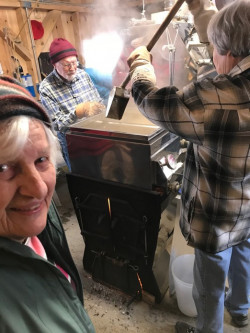 She visited the new facility often during construction and was thrilled to attend the ribbon-cutting with Bobby and Holly Miller and fellow philanthropist Ernie Pomerleau in September 2016. This was to be her last “public appearance” before her retirement. She was cheered to see daughter Barbara and granddaughter Rebecca take on new roles as President and Vice President of the McClure Foundation, and to herself serve as President Emerita and continual cheerleader of the Foundation’s work in partnership with the Vermont Community Foundation.
She visited the new facility often during construction and was thrilled to attend the ribbon-cutting with Bobby and Holly Miller and fellow philanthropist Ernie Pomerleau in September 2016. This was to be her last “public appearance” before her retirement. She was cheered to see daughter Barbara and granddaughter Rebecca take on new roles as President and Vice President of the McClure Foundation, and to herself serve as President Emerita and continual cheerleader of the Foundation’s work in partnership with the Vermont Community Foundation.
Through the COVID pandemic, Lois has kept up with local and national news and loves hearing about the good work being done by the wider philanthropic community of Vermont. She is grateful for the care and the programs available to her at Wake Robin. Every day that weather allows, Lois takes her trusty walker for a stroll outdoors and delights in activities of birds, the changes in the garden, and news from friends and family.
Sources:
(1) ‘Hands On’ Philanthropy, J. warren McClure with Lois H. McClure and Barbara M. Benedict, published privately in 2000
(2) Oral Interviews for “Dames” project co-sponsored by the Vermont Society of the NSCDA and the Vermont Folklife Center, conducted by Greg Sharrow of the VFC, 2014
(3) Personal memoir share by Lois with her family, composed prior to 2015, “All the Macs I Have Known”
(4) Booklet on Vermont Women published “by Charlotte and Porter”.
(5) Newsletter of the American Red Cross, Chittenden County Chapter, Vol. IV, No. 1, March 1982
(6) Personal memoir of Lois, saved for later distribution to her family
(7) Interview with Dr. William Pendleberry, Feb 2020
(8) Interview with Alec Webb, September 2019
(9) Interview with Tom Denenberg, September 2019
(10) Interview with Brenda Torphy, March 2020
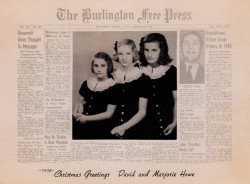 “Lois Jean Howe and her two younger sisters [grew] up in a newspaper family. Her father, David W. Howe, the eldest of seven children of Willard B. Howe, was a University of Vermont graduate and World War I aviator who carried on his father’s business management of their daily newspaper and his leadership in community affairs. Her mother, Marjorie Roberts Howe, was reared in Boston and was a Smith College [classmate] of David’s sister Katherine. Mrs. Howe wrote book reviews, promoted arts and charities and traveled with her husband on business trips. Lois and her sisters grew up with books and music lessons and with the expectation of the good example they should set in their community. The family spent summers south of Burlington in the Lake Champlain cottage bought by Willard Howe [around 1900]. The school year found them in residence in the roomy, modified carriage house made of the redstone so characteristic of the adjacent University of Vermont campus.”
“Lois Jean Howe and her two younger sisters [grew] up in a newspaper family. Her father, David W. Howe, the eldest of seven children of Willard B. Howe, was a University of Vermont graduate and World War I aviator who carried on his father’s business management of their daily newspaper and his leadership in community affairs. Her mother, Marjorie Roberts Howe, was reared in Boston and was a Smith College [classmate] of David’s sister Katherine. Mrs. Howe wrote book reviews, promoted arts and charities and traveled with her husband on business trips. Lois and her sisters grew up with books and music lessons and with the expectation of the good example they should set in their community. The family spent summers south of Burlington in the Lake Champlain cottage bought by Willard Howe [around 1900]. The school year found them in residence in the roomy, modified carriage house made of the redstone so characteristic of the adjacent University of Vermont campus.”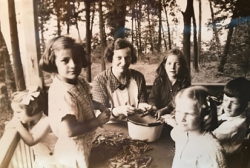 Mac wrote of Lois’s memories of her grandmothers:
Mac wrote of Lois’s memories of her grandmothers: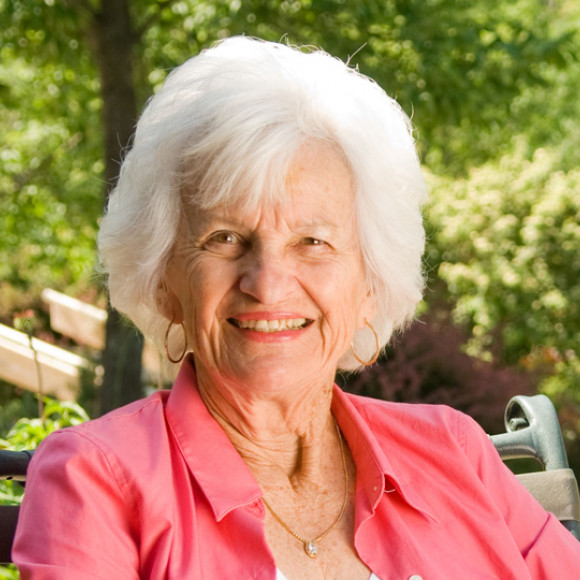
 “I was living with my parents in Burlington with my two young daughters, at the end of a five-year marriage. Mac also was soon to accept that his ten-year marriage was over, regretful to lose much contact with his two sons… Two and a half years later, we found we were both older and wiser, and wanting to, daring to, start a life together. From the start Mac understood and talked about how it was a ‘package deal,’ the three of us would be his new family.”
“I was living with my parents in Burlington with my two young daughters, at the end of a five-year marriage. Mac also was soon to accept that his ten-year marriage was over, regretful to lose much contact with his two sons… Two and a half years later, we found we were both older and wiser, and wanting to, daring to, start a life together. From the start Mac understood and talked about how it was a ‘package deal,’ the three of us would be his new family.” Their lives were full and followed the rhythm of the seasons and of work and school. The couple had an active social life and were committed to their communities. Mac was active in the local Chamber of Commerce activities and would eventually become a board member of the Howard Bank and the Shelburne Museum and a visiting professor at Champlain College (then a two-year business school). Lois served as scout leader and hospital auxiliary member and eventually served on the board of the local hospital, following in the footsteps of her father and grandfather.
Their lives were full and followed the rhythm of the seasons and of work and school. The couple had an active social life and were committed to their communities. Mac was active in the local Chamber of Commerce activities and would eventually become a board member of the Howard Bank and the Shelburne Museum and a visiting professor at Champlain College (then a two-year business school). Lois served as scout leader and hospital auxiliary member and eventually served on the board of the local hospital, following in the footsteps of her father and grandfather. “Each summer when we return to our cottage in Charlotte, I renew my connection with my grandmother, Annie B. Howe. She and her husband, Willard, bought it one hundred years ago. I can see the lilies-of-the-valley that she planted and grow for me every year as well as two spectacular beds of orange daylilies right in front of the porch. I serve dessert in the same cut glass dishes she and her family used for ice cream, the weekly treat made in a hand-cranked freezer.
“Each summer when we return to our cottage in Charlotte, I renew my connection with my grandmother, Annie B. Howe. She and her husband, Willard, bought it one hundred years ago. I can see the lilies-of-the-valley that she planted and grow for me every year as well as two spectacular beds of orange daylilies right in front of the porch. I serve dessert in the same cut glass dishes she and her family used for ice cream, the weekly treat made in a hand-cranked freezer. In addition to her responsibilities at home and as a volunteer, Lois entertained for advertisers of the newspaper and traveled extensively with Mac during the late 1950s and throughout the 1960s in order to attend newspaper trade group conferences to learn of new ideas to build the newspaper business that was so much a part of their lives. They courted national advertisers too, and a relationship with air carrier KLM enabled them to travel to Europe a few times. Mac’s gift as a speaker and Lois’s voracious reading that enabled her to engage in lively conversations with new acquaintances ultimately helped to grow the revenues of the newspaper and to shine a national spotlight on the newspaper group that Mac and his team had built.
In addition to her responsibilities at home and as a volunteer, Lois entertained for advertisers of the newspaper and traveled extensively with Mac during the late 1950s and throughout the 1960s in order to attend newspaper trade group conferences to learn of new ideas to build the newspaper business that was so much a part of their lives. They courted national advertisers too, and a relationship with air carrier KLM enabled them to travel to Europe a few times. Mac’s gift as a speaker and Lois’s voracious reading that enabled her to engage in lively conversations with new acquaintances ultimately helped to grow the revenues of the newspaper and to shine a national spotlight on the newspaper group that Mac and his team had built. It was in Rochester that Lois was able to continue her own education at Nazareth College, close to their home. With her husband traveling often, her daughter married and living overseas, and her son established in his new high school, she had time to become active in her new community through the American Cancer Society and to take classes. She found that her hospital board experience came into play as she wrote papers for her classes. Lois observed that this wouldn’t have happened if she had attended college right out of high school. She graduated with a degree in sociology in 1975 and served on the board of Nazareth College for several years, and later on the board of Champlain College. She would have continued her education to a master’s degree level if it were not for the commute to Buffalo that continuing her education would have required.
It was in Rochester that Lois was able to continue her own education at Nazareth College, close to their home. With her husband traveling often, her daughter married and living overseas, and her son established in his new high school, she had time to become active in her new community through the American Cancer Society and to take classes. She found that her hospital board experience came into play as she wrote papers for her classes. Lois observed that this wouldn’t have happened if she had attended college right out of high school. She graduated with a degree in sociology in 1975 and served on the board of Nazareth College for several years, and later on the board of Champlain College. She would have continued her education to a master’s degree level if it were not for the commute to Buffalo that continuing her education would have required. When she and Mac moved to Florida in 1975, Lois found ways to support her new community. She served on the boards of the chapel and medical center in their new retirement community, ran a furniture consignment store with a friend, entertained extensively, and played tennis almost daily. Mac was easing his way toward retirement at this point, having founded a marketing consulting business and a personal motivation program called “Freedom to Achieve.” Lois served as his secretary, travel manager, and researcher and taught herself computer word processing in the early 1980s, investing in a portable Osborne computer that could be brought to Vermont each summer when the couple drove north to reconnect with family and friends in Vermont. She was an early adopter of email and kept up lively correspondence with family and friends. During this time, Lois learned about the joys of being a grandparent as she continued entertaining often, honing her crossword puzzle skills and traveling to new destinations via People-to-People tennis tours.
When she and Mac moved to Florida in 1975, Lois found ways to support her new community. She served on the boards of the chapel and medical center in their new retirement community, ran a furniture consignment store with a friend, entertained extensively, and played tennis almost daily. Mac was easing his way toward retirement at this point, having founded a marketing consulting business and a personal motivation program called “Freedom to Achieve.” Lois served as his secretary, travel manager, and researcher and taught herself computer word processing in the early 1980s, investing in a portable Osborne computer that could be brought to Vermont each summer when the couple drove north to reconnect with family and friends in Vermont. She was an early adopter of email and kept up lively correspondence with family and friends. During this time, Lois learned about the joys of being a grandparent as she continued entertaining often, honing her crossword puzzle skills and traveling to new destinations via People-to-People tennis tours.  Soon thereafter, at the annual meeting of the Burlington chapter of the American Red Cross, Lois praised the organization’s 2,196 volunteers: “In any volunteering, it is neighbor helping neighbor, showing that they care.” Lois recalled for the group her own association with the Red Cross:
Soon thereafter, at the annual meeting of the Burlington chapter of the American Red Cross, Lois praised the organization’s 2,196 volunteers: “In any volunteering, it is neighbor helping neighbor, showing that they care.” Lois recalled for the group her own association with the Red Cross: Lois gave blood and took a Red Cross first aid course and for many years volunteered each summer at the canteen.
Lois gave blood and took a Red Cross first aid course and for many years volunteered each summer at the canteen.
 The 1980s were busy years for Lois and Mac, both as donors and as patriarch and matriarch for their extended families. Their philanthropy, which is documented in Mac’s journal and “Hands On” Philanthropy, encompassed numerous projects in Chittenden Country, Vermont; in Rochester, New York; and Mac’s community of Athens, Ohio. Highlights include the building of a new visitors center and relocation of a round barn as the “Gateway Center” of the Shelburne Museum in 1986 and the endowment of a professorship in muscular-skeletal research at the UVM School of Medicine in 1987. The couple were recipients as well as donors: they were awarded honorary doctoral law degrees by the University of Vermont in May 1983 and UVM’s highest award, the Ira Allen Award, in 1988.
The 1980s were busy years for Lois and Mac, both as donors and as patriarch and matriarch for their extended families. Their philanthropy, which is documented in Mac’s journal and “Hands On” Philanthropy, encompassed numerous projects in Chittenden Country, Vermont; in Rochester, New York; and Mac’s community of Athens, Ohio. Highlights include the building of a new visitors center and relocation of a round barn as the “Gateway Center” of the Shelburne Museum in 1986 and the endowment of a professorship in muscular-skeletal research at the UVM School of Medicine in 1987. The couple were recipients as well as donors: they were awarded honorary doctoral law degrees by the University of Vermont in May 1983 and UVM’s highest award, the Ira Allen Award, in 1988. As their philanthropy continued into the 1990s, Mac and Lois were drawn to projects that served the needs of the wider community. They provided major support for the Vermont Respite House, The Lake Champlain Basin Center/ECHO, the Multi-Generation Center, Howard Center for Developmental Services, COTS, and more. And they signed on as supporters of the recently created Vermont Community Foundation, establishing two donor-advised funds there.
As their philanthropy continued into the 1990s, Mac and Lois were drawn to projects that served the needs of the wider community. They provided major support for the Vermont Respite House, The Lake Champlain Basin Center/ECHO, the Multi-Generation Center, Howard Center for Developmental Services, COTS, and more. And they signed on as supporters of the recently created Vermont Community Foundation, establishing two donor-advised funds there. In this time, Mac and Lois supported efforts to preserve historic barns and to foster historic education – including spearheading Shelburne Museum's effort to preserve the steamship ‘Ticonderoga’ for generations to come. The ship had special meaning for the couple: Lois’s father and grandfather commuted on the ship when they summered lakeside in Charlotte and Lois boarded it for excursions and dances in her youth. Mac’s first trip to Vermont in 1952 included a trip on the "Ti" – during which he fell in love with Lake Champlain and the Burlington area. And Lois and her family were passengers for the steamship’s final voyage in 1953, after which it was purchased by Mrs. Webb and transported overland to the Shelburne Museum along a rail line specifically constructed for the historic enterprise. As newlyweds, Mac and Lois took their daughters for Sunday drives to see the "Ti" at its new home; four decades later, they regularly visited to follow the preservation progress of Chip Stuhlen and his staff of professional craftspeople.
In this time, Mac and Lois supported efforts to preserve historic barns and to foster historic education – including spearheading Shelburne Museum's effort to preserve the steamship ‘Ticonderoga’ for generations to come. The ship had special meaning for the couple: Lois’s father and grandfather commuted on the ship when they summered lakeside in Charlotte and Lois boarded it for excursions and dances in her youth. Mac’s first trip to Vermont in 1952 included a trip on the "Ti" – during which he fell in love with Lake Champlain and the Burlington area. And Lois and her family were passengers for the steamship’s final voyage in 1953, after which it was purchased by Mrs. Webb and transported overland to the Shelburne Museum along a rail line specifically constructed for the historic enterprise. As newlyweds, Mac and Lois took their daughters for Sunday drives to see the "Ti" at its new home; four decades later, they regularly visited to follow the preservation progress of Chip Stuhlen and his staff of professional craftspeople. When learning of the honor, “Lois was bowled over,” recalled daughter Barbara and son-in-law Bill, present at the announcement event. Mac and Lois were frequent visitors over the next few years to the Burlington lakefront boat shed where craftspeople and volunteers constructed a replica of an historic Lake Champlain sailing schooner based on plans devised from shipwrecks discovered in the lake.
When learning of the honor, “Lois was bowled over,” recalled daughter Barbara and son-in-law Bill, present at the announcement event. Mac and Lois were frequent visitors over the next few years to the Burlington lakefront boat shed where craftspeople and volunteers constructed a replica of an historic Lake Champlain sailing schooner based on plans devised from shipwrecks discovered in the lake. “Recently I have been concerned because everyone who met Mac in recent years didn’t get to know the ‘real’ Mac. And deep inside I worry that maybe I am one of these people, struggling to try to come to terms with what is reality now as opposed to how he was in the past.
“Recently I have been concerned because everyone who met Mac in recent years didn’t get to know the ‘real’ Mac. And deep inside I worry that maybe I am one of these people, struggling to try to come to terms with what is reality now as opposed to how he was in the past. "[…] became very concerned and interested in promoting age-related healthcare and the dignity of age-related healthcare. She was always very attentive, asked great questions, and clearly became very aware about issues relating to aging, aging health, and particularly the dignity that should be associated with caring for people with elders.
"[…] became very concerned and interested in promoting age-related healthcare and the dignity of age-related healthcare. She was always very attentive, asked great questions, and clearly became very aware about issues relating to aging, aging health, and particularly the dignity that should be associated with caring for people with elders. "In the late 1990s, the Housing Trust helped to lead a statewide collaboration that had a goal of doubling homeownership rates. I called Mac and Lois and asked whether they’d be interested in supporting the project. Their $200K contribution was their first program gift – and their first gift made from the J. Warren & Lois McClure Foundation. That gift got us off the ground and helped us to ultimately raise $1M for a program that did in fact double the percentage of homeowners.
"In the late 1990s, the Housing Trust helped to lead a statewide collaboration that had a goal of doubling homeownership rates. I called Mac and Lois and asked whether they’d be interested in supporting the project. Their $200K contribution was their first program gift – and their first gift made from the J. Warren & Lois McClure Foundation. That gift got us off the ground and helped us to ultimately raise $1M for a program that did in fact double the percentage of homeowners. "I see the McClure name in all the right places and their long record of community giving is unequaled in our part of the world. I first remember seeing their name at the University of Vermont Hospital where whole floors are named for them. However it was in my visits to the Lois McClure-Bee Tabakin Hope Lodge and McClure-Miller Respite House that I more fully appreciated the depth and wisdom of the kind and gentle support that the McClure’s provide every day to people in need.”
"I see the McClure name in all the right places and their long record of community giving is unequaled in our part of the world. I first remember seeing their name at the University of Vermont Hospital where whole floors are named for them. However it was in my visits to the Lois McClure-Bee Tabakin Hope Lodge and McClure-Miller Respite House that I more fully appreciated the depth and wisdom of the kind and gentle support that the McClure’s provide every day to people in need.” While Tom Denenberg of the Shelburne Museum related in 2019:
While Tom Denenberg of the Shelburne Museum related in 2019: Lois was always humbled and surprised when she was approached upon her regular visits to the Shelburne Farmers’ Market by people who thanked her in person for her support of various organizations and initiatives and for her willingness to step forward to improve the larger community.
Lois was always humbled and surprised when she was approached upon her regular visits to the Shelburne Farmers’ Market by people who thanked her in person for her support of various organizations and initiatives and for her willingness to step forward to improve the larger community. She visited the new facility often during construction and was thrilled to attend the ribbon-cutting with Bobby and Holly Miller and fellow philanthropist Ernie Pomerleau in September 2016. This was to be her last “public appearance” before her retirement. She was cheered to see daughter Barbara and granddaughter Rebecca take on new roles as President and Vice President of the McClure Foundation, and to herself serve as President Emerita and continual cheerleader of the Foundation’s work in partnership with the Vermont Community Foundation.
She visited the new facility often during construction and was thrilled to attend the ribbon-cutting with Bobby and Holly Miller and fellow philanthropist Ernie Pomerleau in September 2016. This was to be her last “public appearance” before her retirement. She was cheered to see daughter Barbara and granddaughter Rebecca take on new roles as President and Vice President of the McClure Foundation, and to herself serve as President Emerita and continual cheerleader of the Foundation’s work in partnership with the Vermont Community Foundation.